Wellsy wrote:The problem as I see it as you're trying to frame economic terms as similarly applicable in the same way to a worker as it is to a capitalist which I speculate is a tendency in some economics which doesn't take the class distinction to be meaningful and largely ignores essential differences between the two in the notion that it is approaching economics in a formalized and neutral technical way.
Or maybe the same person can actually be both a capitalist and a worker depending on the situation. What stops you, after all, from renting your own home using AirBnB? Aren't you acting as a capitalist in that situation?
Wellsy wrote:FOr example, your talk of human capital and it is dubious if even such a thing as anything more than a metaphor and doesn't actually represent capital as Marx conceives it which I think is relevant in the distinction that you as a worker most certainly are not investing money as capital because it is not to make a profit but a wage and these are qualitatively different things. You are enhancing you possible labour-power, how much which you can earn, this is not capital however and the tendency to ignore distinctions of the sort is problematic. It's not arbitrary but identifying essential differences, it is only arbitrary once one ignores the distinctions to solely emphasize the manner in which they become vaguely analogous.
https://en.wikipedia.org/wiki/Capital_(economics)#:~:text=For%20Marx%2C%20capital%20only%20exists,the%20economic%20system%20of%20capitalism.
That's a weird definition of capital, under it a Picasso portrait could easily count as such. But that's another difference, as the neoclassical definition of "capital" corresponds to goods or services that are used to produce other goods or services. From that point of view, of course the concept of "human capital" makes sense.
Wellsy wrote:In fact profit is clearly distinguished in the costs of production as the capitalist makes an investment in not only the tools and means of production, but in wages for employees. The difference between the input and output within a cycle of production expressing the profit or perhaps the loss.
https://www.marxists.org/glossary/terms/r/a.htm#rate-profit
Unless you want to somehow say that wages are profit, I think you're muddying the waters with the terms as if they're synonymous.
For the worker, wages
are in fact a profit once he discounts his own costs of working (e.g. commuting, training, etc).
Wellsy wrote:I don't think Marx's ideas have lost their relevance at all, I don't agree with the sentiment that things have become obsolete in part because he identified essential aspects of Capital and its relations and we still live in a global capitalist economy than not. There are additions and elaborations that have had to be made in the same vein as Marx's work, but these are compliments rather than a point of obsoletion.
While freelancing might be increasing, it's not something that has displaced the dominant mode of production and everything which flows from it. They still operate within a capitalist economy
https://books.google.com/books?id=tDsui1AA7mIC&lpg=PP1&pg=PA180&hl=en#v=onepage&q&f=false
Indeed, freelancing isn't the dominant mode of production (for now at least) but its very existence is something Marxian theories can't really account for or deal with. Not that freelancing is all that new either.
Wellsy wrote:Basically, regardless of ownership, while capital dominates the mode of production, even if all workers are owners in some sort of co-opt, they're still subject to the competitiveness of the market, the law of value still forces workers to press efficiency in decreasing the SNLT, increase reinvestment of capital, decrease their own wages. The idea being that it's not the case that Marx is singling out capitalist's as the origins of problems of the system, rather they come to personifiy tendencies inherent within it which no individual capitalists controls themselves but merely responds to. So even without the capitalists', if you haven't changed the manner of production, people will still be alienated and this is a big point in Marx's criticism, his critique isn't simply give workers their full labor, his point is about the harm it has upon humanity's being, it is actually a lot radical than a Ricardian Socialist want of full labor payment under the emotion that the equality of exchange is contradicted where as Marx shows that its maintained but labour isn't paid for, labour power is.
http://libcom.org/files/marx,%20marginalism%20and%20modern%20sociology%20-%20clarke.pdf
http://d-scholarship.pitt.edu/10867/1/VWills_ETD_2011.pdf
Thought this might interest you as Marx isn't calling for a kind of equality, he wants a change in production. His criticism undermines this because he maintains that the equality of exchange is not violated in the exploitation of labor by paying only for labour power.
Man is no more liberated as long as his labor is still expressed in a commodity form, as he is still subject to the alienating forces of the market.
If the goal was to change the mode of production then you'll need to find some technological way to make production without using industrial means more efficient than our industrialized production. Perhaps only in an economy where people work mostly in the service industries, performing services that cannot be standardized and automated while leaving all the production that can be automated in the hands of robots? Although right now most of the labor force does work in the service industries (itself a problem for Marxian interpretations, since it's based on producing goods for the most part and I don't think it can account well for e.g. freelance provision of services), there are still plenty of services that are repetitive and perhaps labor intensive, and industrialized in nature where one could attempt an imperfect analogy with the production of goods (it's imperfect because even in those services there seems to be more variation in the output than in the industrial production of goods fulfilling something like a Four Sigma Standard - something that's basically impossible without automating production). However, even those are being gradually automated e.g. people don't wash their clothes manually anymore and no one would set a service to do that nowadays, much of banking is also done through apps (i.e. without conscious human intervention) and banks are gradually closing branches in some places as a result, etc.
Anyway, that change in the mode of production's not coming from a political revolution. If it happens, it will come from a technological revolution and it will be because the change will be more profitable than keeping things as is. It will also be a very slow change and just another stage of the Industrial Revolution we're still in the midst of. And maybe that's where we're going right now, since there is a constant push to automate production as much as possible and indeed automating customized services is one of the hardest things to do, which would thus leave a venue for labor in that sort of activities.
Wellsy wrote:Thank you for sharing the details on the productivity implications of types of programming languages.
I did have the impression that some were limited in what they were useful or worked best in doing and other implications that could make it that no particular language reigns supreme in all cases perhaps but a preferce for what works best for the job's requirements.
But does the government make a profit off of their worker's, do they invest capital into people in that cyclical relation of costs of production, and then come out with a surplus. They may well do such a thing, I don't see why a government couldn't do so, but then they would act just as the capitalist does.
However, the government tends to step in where private enterprise cannot yet yield a profit. And while it might help maintain or even create the preconditions for the accumulation of capital, such preconditions such as enhancing workers education nd thus labour power/wages, doesn't constitute it as capital. I mean, raising children is a necessary task that takes a lot of work and is a precondition to the functioning of society and the accumulation of capital, but such work although useful doesn't yield a profit. But where the aim is the making of something useful, it need not yield a profit.
https://www.marxists.org/reference/subject/philosophy/help/value.htm
It depends on how you stretch the term "profit". If a government performs a good job, gaining legitimacy as a result and thus allows those who run it to establish their own clientelistic networks or to engage in the usual corruption while the public prefers to look to the other side, is this profit? In a very concrete sense, yes, it is.
And if running those services in a minimally competent way allows the government to e.g. collect more tax revenue, then it is effectively making a profit as well.
Wellsy wrote:This is part of Marx's distinction between labor and labor power, labor is universal to all of human history, but labour power is a distinct commodity under capitalist mode of production.
In a commune, it is difficult for me to see the possible distinction of a worker selling their labour-power and thus producing a profit and surplus based on it's difference with the amount of labor performed.
As such it is hard for me to even necessarily see how capitalist relations necessary exist within a commune and where there isn't such a relation of production the idea of exploitation as Marx denotes it under capitalism likely doesn't exist.
However, in the general meaning of the term and colloquially I would say that they are taking advantage of other peoples work i.e. exploiting the advantages or work of others.
I would like to reference a piece from James Connolly to kind of reflect on the conditions of 'wages' within a commune.
Now what I wonder here with the labour note is whether it is the equivalent to ones full hours of labor and is not conditioned by the SNLT of a market.
To help explain...
https://kapitalism101.wordpress.com/2014/07/02/indirectly-social-labor/
That depends on how you regard it. At least that sort of situation, where there is the disconnect between the value of a worker's production and his earnings, would be labeled as exploitation in a different context as you mention. It seems odd to name the same phenomenon differently just because it happens in a commune.
Wellsy wrote:So what happens here is that those who are better able to work or work more are properly compenstated for such, and those who work less or unable may not be paid or based on the community a fund may be raised collectively such in the case of when a tragedies befalls someone and they're unable to work.
https://www.marxists.org/archive/marx/works/1875/gotha/ch01.htm
What you are describing is basically an insurance scheme, but one where you can't opt out (interestingly, it is often inefficient to allow for that e.g. in health insurance). That can also lead to situations where people get less value than what they are paying for.
Wellsy wrote:So there is a similar accounting of labor, but labor isn't compensated based on the social average but in full. This is seen as the first step in breaking the law of value I believe.
So it actually undoes somewhat the tendency for someone to still receive their wage while working less than others because they will not be compensated as much in this scenario, they haven't worked. Here the idea would be the capitalist wouldn't exist or survive because he can't exploit the surplus labor to profit individually, each individual must work. As such, the idea is to undo the very basis of a class distinction.
In what way is labor necessarily being compensated in full in the above scenario? For instance, what makes you believe that those who operate the compulsory insurance scheme above are getting compensated by getting the same value they generate? They could be compensated by far more and become an elite of its own, as it would happen in socialist regimes
Wellsy wrote:Elsewhere had a good yarn about how the Amish do not represent communism and how they in fat are increasingly being drawn into the capitalist economy because they aren't entirely self-sufficient communities but are reliant on tourism and paid work outside of their communities.
https://www.politicsforum.org/forum/viewtopic.php?t=175024
Which I think points to the difficulty in how tenable preconfigurative politics is, as it seeks to simply act as one's ideal and collapses the means into the end as opposed to delinating the means to the broader end of how to change production overall and not in one's small 'island'.
But that also happens because it's more profitable to the community at large to do that rather than just live in autarchy.
I think one problem with Marxians in general is that you guys are using some very specific definitions for some terms such as "capital" or "profit", and end up ignoring some relevant dynamics as a result. For example, if you'll stick to Marx's definition of capital you quoted above, then how do you define the production of a service (which cannot be resold by definition) aimed at producing goods or other services? Or how do you call the decision by some to study a degree to earn more and is it really all that different from deciding to buy a machine to produce and sell stuff? I actually wonder if Marx would agree with those narrow readings of his theory if he were alive today.
ckaihatsu wrote:Funny -- you seem to think that *differences* with Marxist political economy are somehow Marxist themselves.
Gotta hunt those heretics, heh?
By the way, Okishio in particular actually proved the Fundamental Marxian Theorem
ckaihatsu wrote:Your acceptance of the real-world phenomena of falling prices and capitalist overproduction means that you're acknowledging the empirical evidence for Marx's 'Tendency of the Rate of Profit to Fall', or the declining rate of profit. Real or nominal variables in the measurement of such makes no difference.
Actually we don't often see deflation in the real world

That deflation would only be true if money supply was non-increasing and there were constant increases in productivity. The tendency of the profit rate to fall is on the other hand not a given as shown by Okishio (there need to be assumptions made to conclude that) and plenty of literature as we saw a while ago when we actually saw some of the empirical research on the matter.
ckaihatsu wrote:Okay, regarding the value of *commodities*, here it is:
That's one of the things I'm referring to. Paradox of water and diamonds, you know

ckaihatsu wrote:Well, gee, I'm still *not* convinced otherwise, even by your lack of effort, so it's going to go on my calendar for *months* from now, now.
Here's how it works:
[11] Labor & Capital, Wages & Dividends
What else is there to say? Who the hell decides on whether to buy something based narrowly on its cost of production as opposed to sale price?
ckaihatsu wrote:Thanks for asking. Right here:
[11] Labor & Capital, Wages & Dividends
Explain yourself.
ckaihatsu wrote:No, Marx's theory of value is not nearly as open to interpretation or ambiguous as you're claiming it to be. Here's another diagram on it:
[23] A Business Perspective on the Declining Rate of Profit
Then you'd need to account for some of the issues I mentioned there, such as finding new uses for a given commodity as a result of scientific innovation. That means use values are not all that well defined, let alone constant, in practice.
ckaihatsu wrote:This is only within the context of this bunch of workers who somehow saved up enough wages and received enough charity / financing, to *buy out* the business that they work at -- it's a preposterous formulation to begin with, and I've shown that it's an *undesirable* one for the workers, too, because of the economic risk involved and the economic necessity to self-exploit their own labor power for the sake of the business.
That would also apply to means of productions that were taken over by force.
ckaihatsu wrote:Now you're indicating that there could very well be *infighting* among these potential co-owner workers, over their own varying degrees of individual productivity, for the enterprise. It wouldn't be 'exploitation', though -- it would be disproportionate inputs of 'sweat equity' among the co-owners which would have to be worked out economically in terms of formal shares of equity in the business.
That's a very unconvincing answer. Why couldn't call disagreements between workers and business owners as fights over "sweat equity" as well?
ckaihatsu wrote:Again, not 'exploitation' because buying into the business was *optional* and *discretionary* for each and every one of these hypothetical co-owner workers. Any one of them, or all of them, could *divest*, and cash-out, to alleviate any friction arising from such contentious co-owner dynamics.
And workers can quit and work elsewhere or start their own businesses.
ckaihatsu wrote:Wellsy has given us all a good refresher course on Marx's political economy -- note, from it, that Marx *eschewed* any formal abstractions of 'value', as those touted by communal types for inter-communal economic exchanges. Marx held up the simple internal social reciprocity of labor-*time* vouchers, outside of conventional capitalist exploitation of labor and its expropriation of surplus labor value.
I don't think he's actually touched that point. I'd be interested to read him out on it.











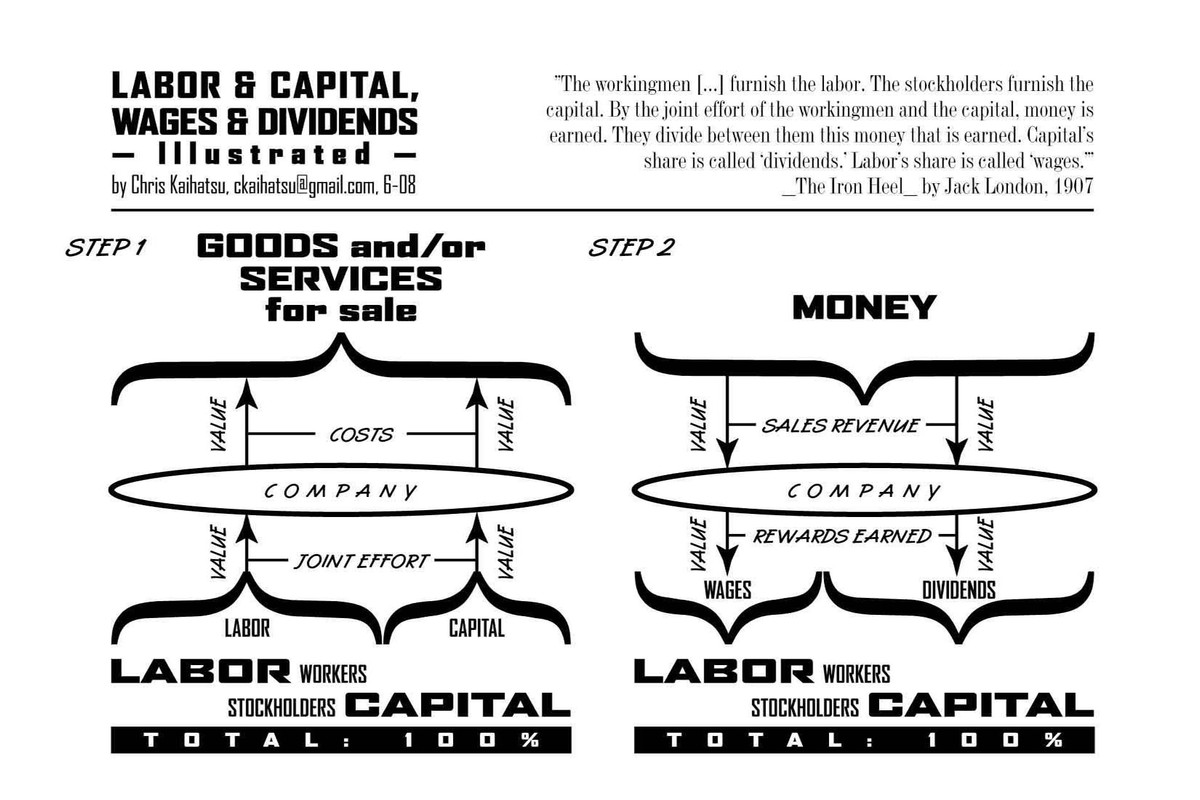
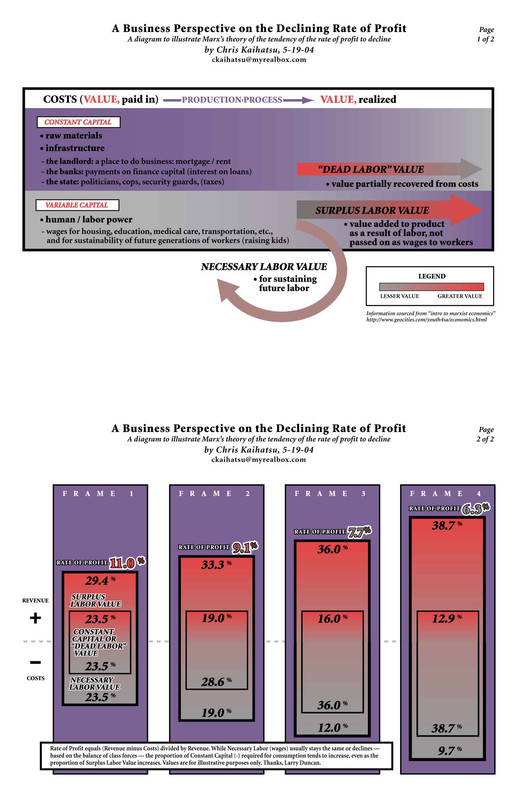

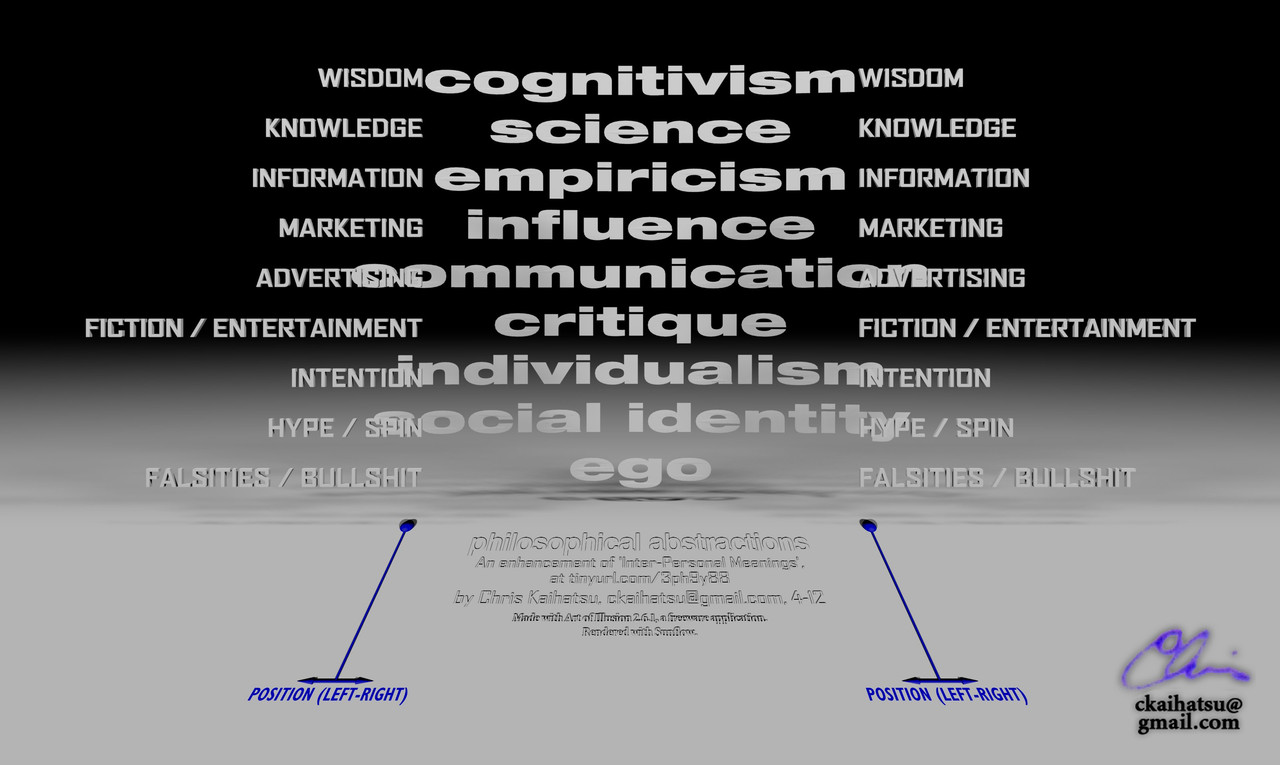
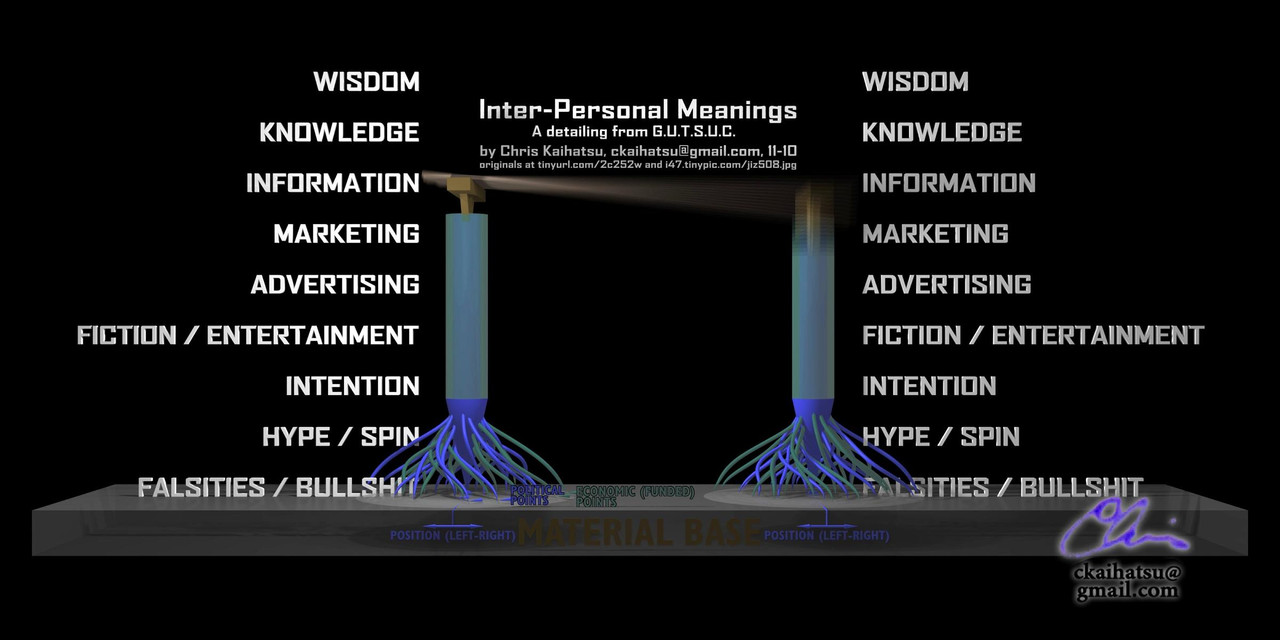


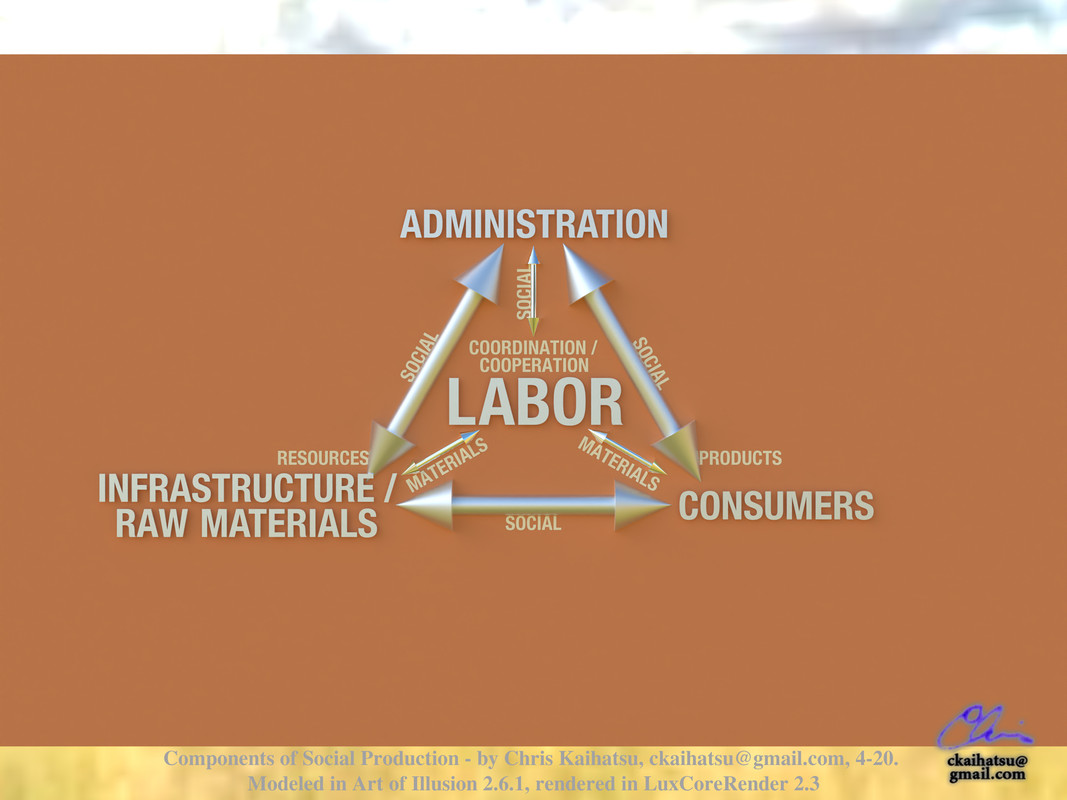

 - By JohnRawls
- By JohnRawls